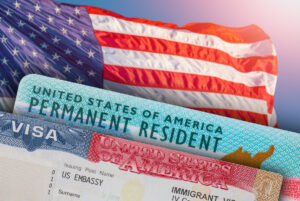The Options for Obtaining a Green Card
 If you are a foreign national living in the United States, you know the potential benefits of obtaining a green card, which grants you permanent residency status:
If you are a foreign national living in the United States, you know the potential benefits of obtaining a green card, which grants you permanent residency status:
- A green card allows you to live and work here for as long as you want.
- You won’t have to fear deportation or removal proceedings, unless you commit certain types of serious crimes.
- You’ll have no restrictions on the type of employment you pursue.
- You can start your own business without concerns about losing your right to stay in the country.
- You’ll have access to a wide range of government benefits and services, including financial aid for education, as well social security disability or income benefits.
- You can sponsor family members for permanent residency.
- You’ll have access to a wide range of healthcare services.
- Your children can attend public schools.
- You can travel freely inside and outside of the United States without a visa.
How can you get a green card? What are the different pathways available in 2025 for obtaining lawful permanent residency?
The Different Ways to Pursue a Green Card in 2025
There are generally four avenues for obtaining a green card—based on your family status, your employment status, your ability to make capital investments in the United States, or based on humanitarian reasons.
Family-based green cards: The easiest and typically fastest way to obtain a family-based green card is through an immediate relative who is a U.S. citizen. With this approach, you can often obtain your permanent residence status within a one-to-three-year period. There are restrictions, though—only spouses, siblings, minor children (under 21), and parents of U.S. citizens over the age of 21 are eligible. There is, however, no numerical cap on the number of such visas that may be issued annually. You can also pursue a family-based green card as the spouse or unmarried child of a green card holder.
Employment-based green cards: To qualify for an employment-based green card, the best and fastest pathway to success is through an EB-l visa as a priority worker. These visas are generally available to individuals with “extraordinary” ability, including multinational business executives, researchers, scientists, scholars, or professors. Unlike other types of visas, applicants for an EB-1 do not need a sponsor.
Investment-based green cards: Individuals who commit to invest a minimum of $800,000 in a business enterprise in the United States that creates jobs can apply for a green card through an EB-5 visa. Estimates are that such visas potentially take up to three years to process, but there are currently no backlogs for this type of visa.
Humanitarian-based visas: Individuals may also apply for green cards if they are experiencing certain emergency or humanitarian needs. For example, a person may be granted asylum in the U.S. if they are unable to return to their home country due to expected violence or persecution. After one year, an asylee is eligible to apply for a green card. Green cards are also available to victims of abuse under the provisions of the Violence Against Women Act (VAWA). In addition, green cards are potentially available for holders of U visas (victims of crimes who aid law enforcement) and T visas (persons who have been subjected to human trafficking).
There’s also a special category, whereby green card applicants who are juveniles, U.S. government employees abroad, or religious workers can obtain an EB-4 visa.
What About the Green Card Lottery?
Also known as the Diversity Visa Lottery, this program makes up to 55,000 immigrant visas available on an annual basis. Priority in the lottery is given to individuals coming from countries with low immigration rates to the United States. Eligible applicants are randomly selected. The process generally takes about a year and a half to two years. Accordingly, individuals who apply in 2025 will be included in the 2027 lottery. The registration dates in 2025 run from October through November.
Contact the Experienced Immigration Attorneys at Bailey & Galyen
At the law offices of Bailey & Galyen, we bring more than 40 years of experience to people in the Dallas-Fort Worth metroplex and across Texas who are seeking to become permanent residents in the United States or who have any other type of immigration needs or concerns. To speak with a knowledgeable and skilled immigration lawyer, contact us by e-mail or call our offices. Our phones are answered 24 hours a day, seven days a week.








